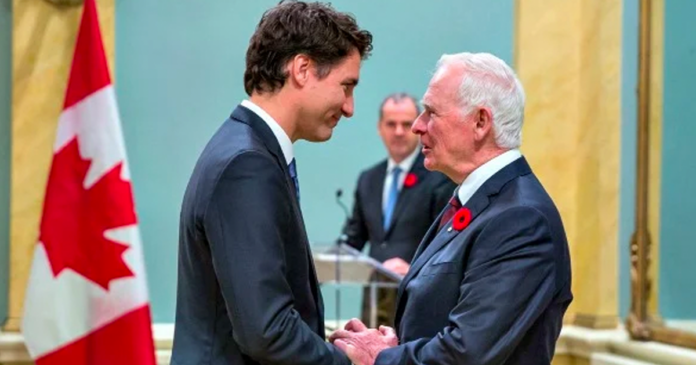The vote left no doubt where the House of Commons stood when it came to demanding special rapporteur David Johnston resign.
The vote for his ouster was 174-150.
The former governor general released a statement following the vote on a motion brought forward by the NDP, which the Conservatives and Bloc Québécois supported while the Liberals stood opposed.
His reason for refusing to step down? He was appointed to probe allegations of foreign interference by the Liberal government of Prime Minister Justin Trudeau, and not by the Commons.
The motion called on Johnston, whom Trudeau named back in March to look into allegations that China tried meddling in the past two federal elections, to “step aside from his role.”
It asked the government to instead launch a public inquiry into the issue of foreign interference, a move that all opposition parties want, but that the former governor general recommended against in his initial report last week.
“When I accepted the mandate to act as independent special rapporteur, I did so with full knowledge of the fact that the work ahead would be neither straightforward nor uncontroversial,” Johnston said in his statement.
“I deeply respect the right of the House of Commons to express its opinion about my work going forward, but my mandate comes the government. I have a duty to pursue that work until my mandate is completed.”
Earlier in the day, Trudeau said he maintained confidence in Johnston, despite the stance of opposition MPs.
Opposition parties initially decried his appointment because of Johnston’s family connections to the prime minister’s family and the Pierre Elliott Trudeau Foundation.
Trudeau brushed off those concerns, telling reporters that he views the matter as political parties wanting to score “partisan points.”
“The fact of the matter is David Johnston has served this country in extraordinary capacities for decades,” Trudeau said on his way into a meeting with his Liberal caucus.
“He’s taken this incredibly seriously.”
Johnston said in his report that due to the sensitive nature of national security and the intelligence he studied, there would be no way to divulge the information Canadians are seeking publicly. He said that would defeat the purpose of a public inquiry.
He said what he plans to do instead is hold a series of public hearings to further probe the issue.
Those hearings would focus on hearing from officials of both past and present governments, as well as members of diaspora communities affected by foreign interference attempts.
“As I have indicated, there is much work yet to be done and a further public process is required to identify specific reforms that are necessary to preserve the integrity of our democratic institutions.”
“Foreign governments are undoubtedly attempting to influence candidates and voters in Canada, and I have identified serious shortcomings in the way intelligence is communicated and processed from security agencies through to government,” Johnston said in his statement Wednesday.
There is a new Leger poll, however, which indicates Canadians have not bought into Johnston and his appointed role.
According to Leger, Canadians are not satisfied with the findings and recommendations of Johnston in his role as special rapporteur on foreign interference.
Johnston released his first report on Tuesday in which he shut down calls for a public inquiry into the matter.
The Leger poll, commissioned by the National Post, suggests that many Canadians are not persuaded by Johnston’s report or his reasoning.
According to the poll of 1,531 Canadians recently conducted online, only 27% of respondents said they believe Johnston’s report was “rigorous impartial work” or contained “foreign policy expertise.”
Thirty-three percent said they don’t agree that Johnston’s report was grounded in sufficient expertise or impartiality, while 40% said they are either not sure or do not know.
Half said they do not think that Johnston’s report will “change anything” in the way the government handles foreign interference in the next election, while 25% said they think it will and 25% said they are unsure.
The poll also reveals that Canadians are concerned about China’s influence and activities in Canada, and that they have low trust in the federal government’s handling of the issue.
More bad news for the Liberals.
